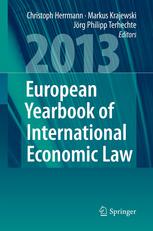

Most ebook files are in PDF format, so you can easily read them using various software such as Foxit Reader or directly on the Google Chrome browser.
Some ebook files are released by publishers in other formats such as .awz, .mobi, .epub, .fb2, etc. You may need to install specific software to read these formats on mobile/PC, such as Calibre.
Please read the tutorial at this link: https://ebookbell.com/faq
We offer FREE conversion to the popular formats you request; however, this may take some time. Therefore, right after payment, please email us, and we will try to provide the service as quickly as possible.
For some exceptional file formats or broken links (if any), please refrain from opening any disputes. Instead, email us first, and we will try to assist within a maximum of 6 hours.
EbookBell Team

4.8
94 reviewsPart one of Volume 4 (2013) of the European Yearbook of International Economic Law offers a special focus on recent developments in international competition policy and law. International competition law has only begun to emerge as a distinct subfield of international economic law in recent years, even though international agreements on competition co-operation date back to the 1970s. Competition law became a prominent subject of political and academic debates in the late 1990s when competition and trade were discussed as one of the Singapore issues in the WTO. Today, international competition law is a complex and multi-layered system of rules and principles encompassing not only the external application of domestic competition law and traditional bilateral co-operation agreements, but also competition provisions in regional trade agreements and non-binding guidelines and standards. Furthermore, the relevance of competition law for developing countries and the relationship between competition law and public services are the subject of heated debates. The contributions to this volume reflect the growing diversity of the issues and elements of international competition law.
Part two presents analytical reports on the developments of the regional integration processes in North America, Central Africa and Southeast Asia as well as on the treaty practice of the European Union. Part three covers the legal and political developments in major international organizations that deal with international economic law, namely the IMF, WCO, WTO, WIPO, ICSID and UNCTAD. Lastly, part four offers book reviews of recent works in the field of international economic law.